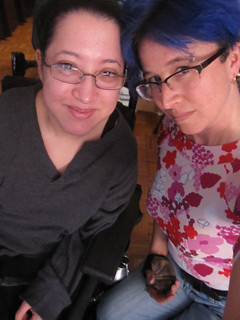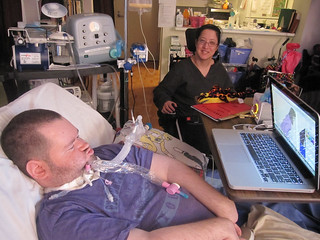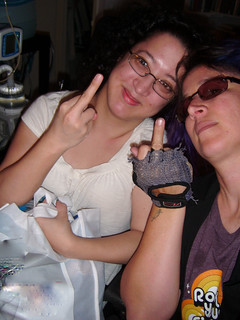Aleja and I met online through GimpGirl years ago. I got to know Nick as well; we chat often about space exploration, writing, and comics. We have mutual friends like Jen Cole and Ron Sidell. We met in person in New York finally! Both at the BlogHer conference and then over Thanksgiving while I was in town for the Committee to Protect Journalists fundraiser.
On Monday I was asking Aleja and Nick if they had anyone with them. Akemi had come over to stay with them through the hurricane but they did not expect at all to lose power and water. I was on vacation in Mexico. My electric mobility scooter had broken, so I had limited ability to go places and was spending a lot of time online following the news and writing to friends.
From my work during and after Hurricane Katrina I know how fast situations can deteriorate and how important logistics are. Simply having people on the spot is amazingly useful. Once they are there, they can see what needs doing. I offered to reach out on my social networks to see if anyone near them might be able to come over and help out. At that point I began to realize the complexity of what support they might need, as well as many of the pressures against asking for help.
Personally, I have a ton of support and resources, yet it only takes a little change in my circumstances to unbalance the whole house of cards. When my needs change, or become more visible, other people sometimes then begin to treat me like I’ve crossed a line into complete loss of control of what happens. I didn’t want that to happen to Nick, as it so often does, and for him with life threatening consequences. And for Aleja who I love dearly I could picture how outsiders would not be able to see the level of work she does and how necessary it is. We value our independence, including our ability to plan and ask for help. But for me personally that comes with a confusing mix of pride and shame, fear and anger, for the times things don’t go as I had planned and predicted. I struggle with this. People are very, very disrespectful and I don’t like to be dehumanized. But to get along and survive, sometimes we have to just eat disrespect. For Nick and Aleja, crossing that line could mean someone would try to force Nick to evacuate without real infrastructure in place to support them and his health care, and his breathing. (And in fact, that just happened. TWICE.) Being evac-ed could kill him, but even if it didn’t, would it result in some bureaucrat or social worker deciding he should be incarcerated — forced into an institution? Would it disrupt their lives to the point where Nick and Aleja wouldn’t be able to come home together? (They already can’t get married.) When I’m casually dehumanized I lose a little dignity and I get mad. When Nick is, his life is on the line. William Peace describes the dangers of the medical model of disability very well in his blog Bad Cripple, which I recommend highly.
In this photo Aleja and I express our feelings about oppression and ableism by flipping them off with a smile:
Anyway, I worried that I was pressuring Aleja to consent to my sending in some stranger (though a friend of a friend) into their home whether to help with personal care or just to bring them food and water or try and find a way to get power to Nick’s breathing equipment. As soon as they said it was okay, I put out a call. It propagated quickly. Suddenly thousands of people were twittering to me or messaging me on Facebook. I was frantically trying to apologize to Aleja over IM for embarrassing them since my twittered request for help went way out of control. Over the next few hours it became apparent that a support network would have to mobilize. And it did! Three out of the thousands were able to offer practical help rather than just saying “Call 911! Call FEMA” (yeah right!!!), and they joined what was quickly organizing to be a team effort from people who hadn’t known each other before. I was glued to my computer talking with people, gathering information from many sources and redistributing it to others, trying to spare Alejandra’s and others’ limited cell phone batteries. Len Burns became my point of contact with Aleja. They needed sterile water, rides for their nursing/PCA staff because the subway was not running, cash for all sorts of things, drinking water, batteries for flashlights, and many more things that had to be brought up and down 12 flights of stairs. Leslie Freeman was the first to get there, I think, other than Akemi. They are both beyond awesome! My friend Lauren who is a journalist and feminist activist also made it there.
Then I began following Crystal and Sandi Yu’s epic road trip in the middle of the night driving from Boston to New York City, stopping at every Walmart, AutoZone, and truck stop on the way to get supplies. When I realized Crystal is also a wheelchair user and that she and Sandi had barely met, I was cheering them on so hard and felt a deep happiness to find these kindred spirits doing something I could at least support from a distance. I donated quickly over PayPal and Crystal was able to use the money right away with a PayPal debit card. Meanwhile, Amalle was coordinating an ever growing Google Doc of information about how to help and exactly what to do. There was a schedule of people volunteering for shifts and to drive Nick’s nurses back and forth from home to work.
Crystal and others also began, at some point, getting money from Portlight — where I am also now donating! Carrie Ann Lucas connected the group to Portlight. I really like getting cash directly to people in a crisis and to “unofficial first responders”, as I will never forget the amazingness of handing wads of 20 dollar bills (given to me by strangers who read my blog) directly into the hands of evacuees in the Houston Astrodome so they could get to their families, buy diapers and gas, and get the heck out of that refugee camp. Aside from the help…. they were fueled by trust. No fuss, no forms, no proving things to people behind desks, just direct practical help.
I love Crystal’s quick and detailed writeup of the history of how she became involved and what she and Sandi did, from Crystal’s blog LittleFreeRadical: UnconVENTional Aid: Helping Nick Dupree, Social Networking Style. I would love to hear the stories of others like Leslie and Amalle and Akemi who are doing so much as well as what this has been like for Aleja and Nick. It is important not to lose our history.
On Wednesday I started doing research on legal issues for Len Burns, to see what options existed for protecting Nick against other people’s non-helpful 911 calls on him, and discussed battery tech and power inverters with other people active in the efforts. At some point Tuesday or Wednesday I Facebook-friended and began talking with Leslie and then Crystal and others working to help; I could see their comments on Aleja and Nick’s and Len’s posts. Now I’m happy to know them and can tell we have a lot in common — our willingness to jump into a situation and improvise, for one! And I understood Bethany Stephens‘ use of the word “cripfam” a bit more deeply because I felt that recognition of friends who will go all out, who know what “solidarity” means…
Meanwhile this happened: Invalid New Yorker’s Pals Keep Life Saving Gear Running. While I can see the effort this reporter made to be helpful, the disrespectful language and the way the story frames Nick and Aleja both made me furious and sick to my stomach. The reporter couldn’t even be bothered to get a quote from Nick but described his very act of speaking as “burbling” etc, in ways that are classically dehumanizing… as non-speech, as non-human, as alien other. I can see reporters will think this an interesting story — and it is, but not like this, not this easy win at Disability Reporting Bingo. Most of the people helping here are also people with disabilities, for example. There are stories to tell about technology, the Internet, hardware, proprietary medical tech, the connections to OccupyWallStreet and activism, and many other complexities. I wrote to the reporter and his editor, and commented (mildly, for me, and without swearing) on the story.
My main usefulness has been to bring attention to the situation and get others involved. People pay attention to my thoughts on this because of my history of public speaking, and blogging; my involvement with hackerspaces, DIY technology, and activism; and because I did some useful on-the-spot work for Hurricane Katrina relief. I also was able to donate money directly to Crystal and to Portlight. Please pitch in if you can, to share resources and skills, because the situation over the East Coast and NYC in general is still deteriorating as gasoline and supplies run out across the area.
Here’s how to help right now: Lending a Hand
Big organizations like FEMA and the Red Cross do useful work, but usually not at this stage of chaos on this individual level. A week and a half from now they’ll be in charge whether they’re effective or not, but right now it’s anarchy, so we have a chance to be the most useful with direct action. Just go…right now while it’s crucial… go to wherever the problem is, LISTEN TO PEOPLE… and pitch in. Don’t just donate some old clothes or cans of food as if you can dump your trash on other people and it will magically make them middle class and give them all the infrastructure of your massive privilege! Go to gather information, find out what is needed, improvise, and DO SOME WORK.


